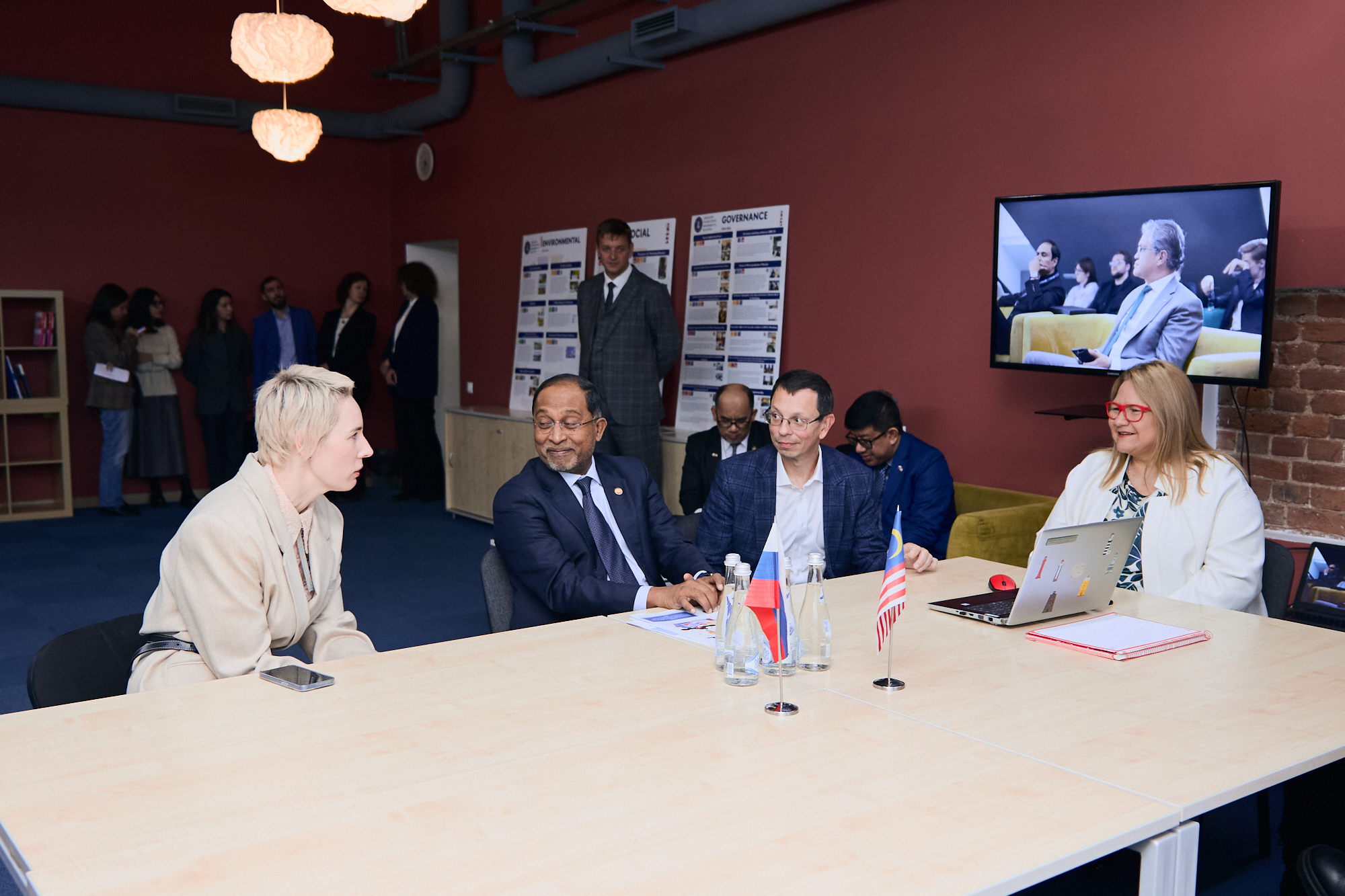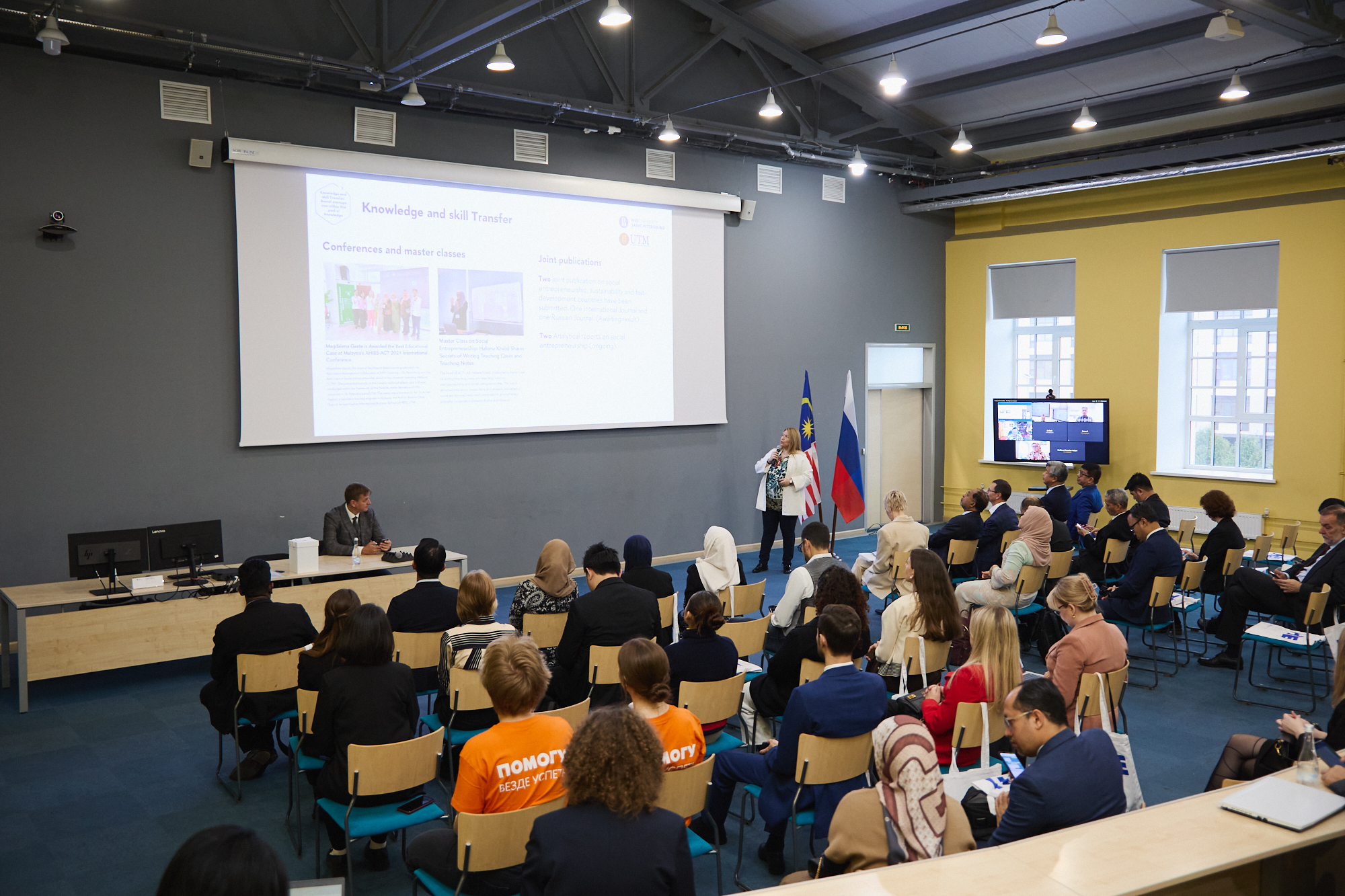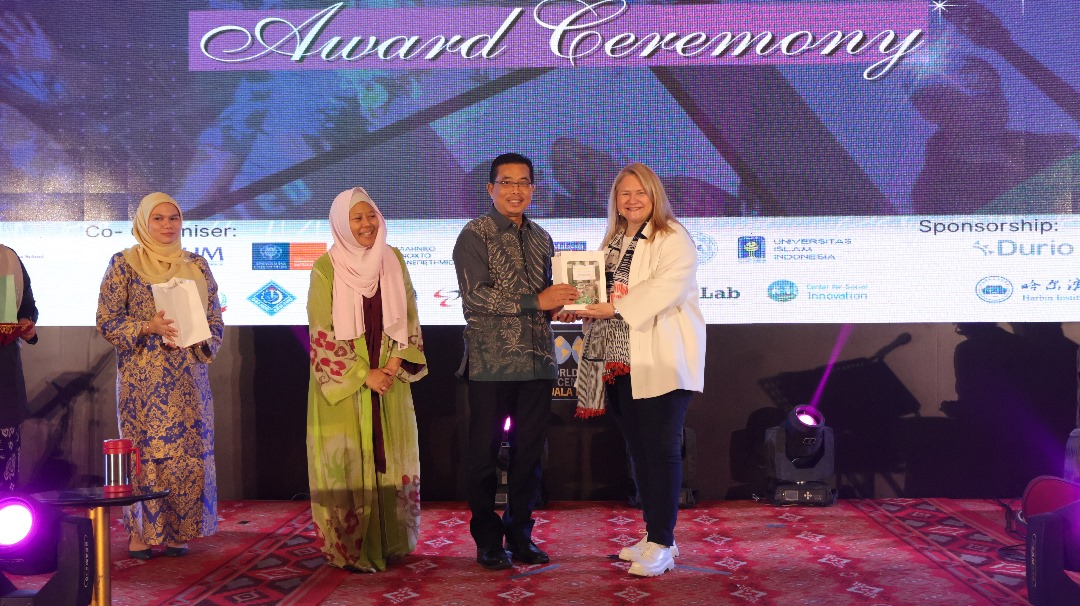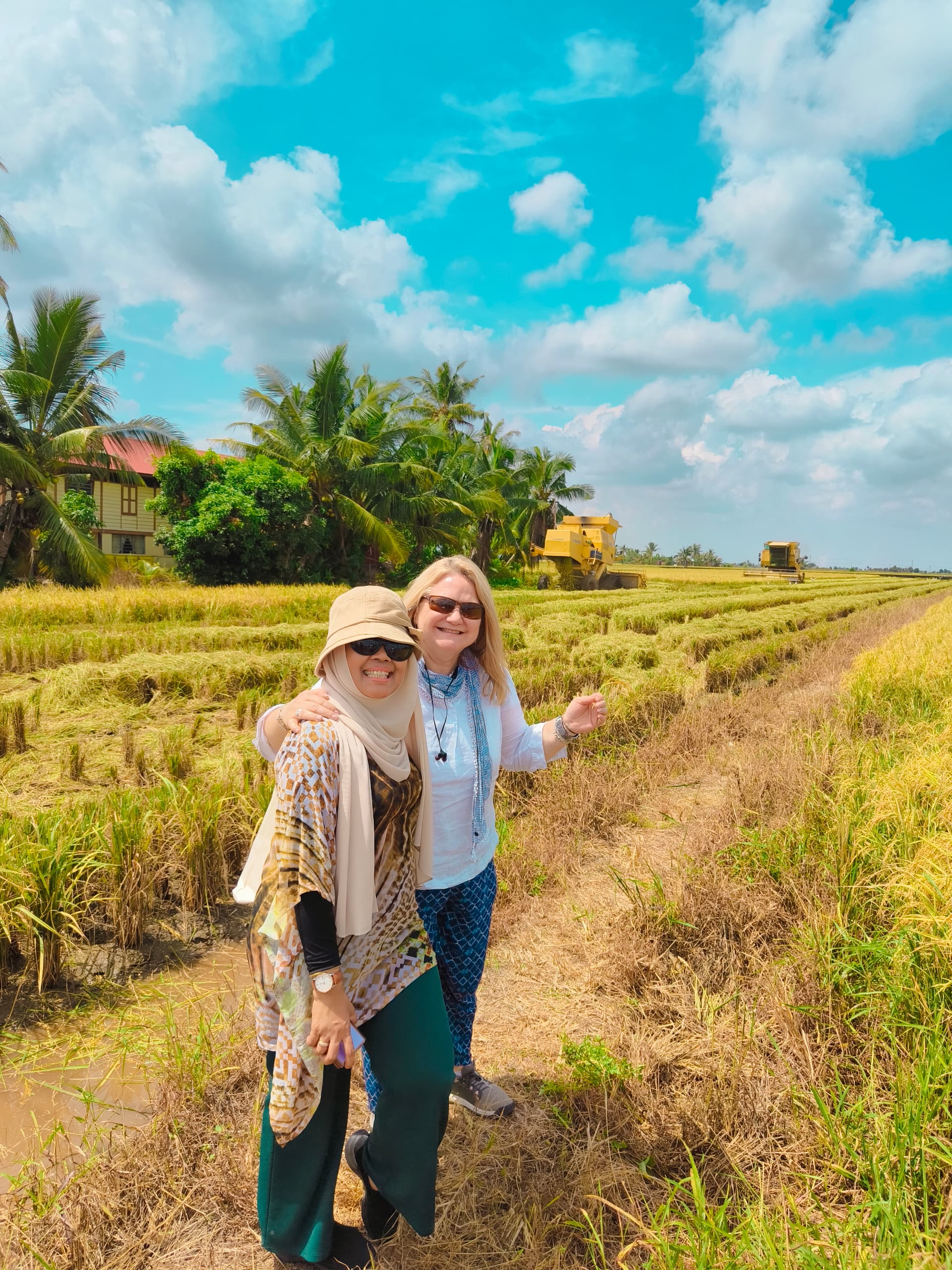Social Entrepreneurship without Borders: Mirror Lab of HSE and UTM

Last fall, a Malaysian delegation led by Minister of Higher Education Zambri Abdul Kadir visited the HSE University campus in Saint Petersburg. One of the key topics of the meeting was the discussion of the initial results of the collaborative efforts between the mirror lab of HSE Saint Petersburg and the Universiti Teknologi Malaysia (UTM).
Anna Tyshetskaya, Director of the National Research University Higher School of Economics in St. Petersburg:
"The Saint Petersburg campus has initiated interactions with the Asia-Pacific region, including with Malaysian universities. This direction is important for us as universities in the Asia-Pacific have significantly advanced in the rankings over the past few years, both overall and in specific subjects. Additionally, Asian universities are very attractive in terms of academic mobility for students and are comfortable both in building business contacts and at the communication level.
The development of mutually beneficial relationships with Asia-Pacific universities is primarily practical in nature. At the Saint Petersburg campus, together with colleagues from UTM, we have launched a mirror lab in the field of management and a joint student business incubator. This approach supports technological leadership and practically implements students' entrepreneurial ideas.
Educational cooperation with Malaysia is important for HSE University — Saint Petersburg. Among our partners are five leading Malaysian universities. The creation of a joint mirror lab with UTM has taken our collaboration to a new level. We continue our work and look forward to new projects with Malaysian universities."

The international mirror lab created in 2023 by the Higher School of Economics in Saint Petersburg and the Universiti Teknologi Malaysia has become a unique platform for advancing social entrepreneurship as a tool for sustainable development. By combining the efforts of scientists, students, and practitioners from different countries, the lab has achieved impressive results. Magdalena Gaete, the head of the lab, discusses the history of its creation, the team, the initial results, and the new challenges faced by the lab.
— How did the collaboration between HSE University in Saint Petersburg and the Universiti Teknologi Malaysia develop?
— Already at our first meeting with colleagues from the Azman Hashim International Business School (AHIBS) at the Universiti Teknologi Malaysia (UTM) in July 2023, we saw opportunities for interdisciplinary collaboration between the Reputation Management in Education Lab (RepLab), which studies reputation management and resilience in higher education, and the ACT LAB at the AHIBS UTM business school. This collaboration is focused on working with the fourth sector (social entrepreneurs) and sustainable development within the framework of the Quintuple Helix model of innovation[1].
[1] Quintuple Helix describes the interaction of universities, industry, government, society, and the environment within the framework of the knowledge economy.
Just three months after the first meeting, the teams from HSE University — Saint Petersburg and the Universiti Teknologi Malaysia developed a joint action plan for the project's development. The work done highlights the speed and efficiency with which both teams were able to coordinate their efforts and resources for the advancement of research and interdisciplinary activities within the established collaboration.

It should be noted that in May 2023, our rectors signed a memorandum of understanding during the International Economic Forum "Russia — Islamic World: KazanSummit." The collaboration between the Higher School of Economics in Saint Petersburg and the Universiti Teknologi Malaysia began with the creation of a mirror laboratory for social entrepreneurship, which is a fruit of international academic cooperation. This partnership was officially formalized in November 2023 during the visit of the Russian Minister of Education to Malaysia.
This partnership also includes the development of strategies and innovations in this field, which highlights the multidisciplinary nature of the project. The laboratory actively interacts with government organizations, NGOs, corporations, and small and medium-sized socially oriented businesses.
— Please tell us about the team of the mirror laboratory.
— Within our laboratory, which is located both in Saint Petersburg and Kuala Lumpur, scientists and students from both universities work together on research in the field of social entrepreneurship in Russia and Malaysia.
The team of the mirror laboratory was formed as an international group of researchers and practitioners, each contributing uniquely to the development of the project, with an emphasis on a multidisciplinary approach to studying social entrepreneurship. The team from the Russian side was formed based on the professional expertise and scientific interests of the participants, allowing the laboratory to effectively work on international projects. I would also like to highlight the active participation of undergraduate and graduate students in the project work. In 2024, 64 students from various campuses and divisions of HSE participated in research related to social entrepreneurship. These works allowed the students not only to develop theoretical knowledge but also to apply it in practice. For example, some students participated in the All-Russian Summer School on Social Entrepreneurship at SPbU and the All-Russian Forum of Social Calling "Dobrino" in Khanty-Mansiysk. These events integrated the research conducted within the project into a broader educational and practical context, facilitating a deeper understanding and implementation of socially significant projects.
— What results were achieved in the implementation of the joint project in 2024?
— The results of our team's work are already visible in various areas, including research, conferences, and the preparation of analytical reports on social entrepreneurship in Russia.
In 2024, our mirror laboratory released a series of significant analytical scientific materials. The first report, "Social Entrepreneurship in Russia — 2024," has over 100 pages and covers the current state and prospects for the development of social entrepreneurship in Russia. A review of approaches to social entrepreneurship by nine scientific schools was also conducted, and a literature analysis on this topic in BRICS countries was completed.
As part of the research activity, a database of social entrepreneurs was created, including information from the registry of small and medium-sized enterprises, updated on June 10, 2024. It includes information on 10,259 entrepreneurs from Russia. This database aggregated statistical information, including company contacts, descriptions of their activities, and sustainable development goals (SDGs) they aim to achieve. In addition, open data sources were used to supplement the information. Based on the analysis conducted, conclusions about the current situation in the field of social entrepreneurship in Russia were formulated, and recommendations for its development were developed. A database including 388 social enterprises in Malaysia was also formed.
In addition to the primary data, a registry of research literature was prepared, which, while focusing on Russia, Malaysia, and Mexico, also covers BRICS participants and Latin American countries. These materials comprehensively and holistically illuminate the situation with social entrepreneurship in the specified countries, allowing for the identification of their achievements, problems, and development prospects. This registry plays a key role in ensuring a deep understanding of the differences and similarities in approaches to social entrepreneurship, which contributes to the development of effective strategies and policies at the international level.
In 2024, three international scientific conferences were held, focusing attention on social entrepreneurship and its impact in different regions. The first conference, "Synergy of Changes: Interregional Partnership in Social Entrepreneurship," took place on June 14 in Kuala Lumpur. The laboratory, with the participation of colleagues from Malaysia, Mexico, as well as partners from Saint Petersburg and other Russian regions, organized it. The second conference, AHIBS Global Research Exchange, was held in an online format on October 16 and gathered more than 50 interdisciplinary researchers from Russia and Malaysia. I presented the results of the mirror laboratory's work and a report on the impact of social entrepreneurship on the environment of both countries. The third conference, "Social Impact in the Modern Era: Unleashing the Potential of Social Entrepreneurship," was held in late November 2024 in a unique expert day format and brought together experts at a venue in Saint Petersburg from SPbU, RANEPA, the Analytical Center at the Government of the Russian Federation, as well as founders and managers of social enterprises. Online connections from foreign partners enriched the event and made it possible to discuss the common and particular in the development of social entrepreneurship in different countries, both from a scientific research perspective and in practical terms. A workbook and a position paper were developed for the event, and a resolution was prepared based on the outcomes. These materials facilitate a deep understanding and discussion of the opportunities for the impact of modern social enterprises on societal development and the unveiling of their potential from the perspective of stakeholders.
Another result of the project was the writing of a case study, based on the analysis of databases of social entrepreneurship in Russia and Malaysia. The case study "Transforming Social Elder Care and AgeTech in Russia: Opeka Nursing Homes — Getting rid of stereotypes" tested new methods of presenting social entrepreneurship to students. This work was presented at the international conference of the Azman Hashim International Business School of the Universiti Teknologi Malaysia "Act to Impact, Transform to Reform," which took place June 10–12, 2024, at the UTM base in Kuala Lumpur and received an award for the best case on social entrepreneurship of the conference.
Additionally, it is worth mentioning that an important event in this context was a master class conducted by Khaliyana Khalid, head of the ACT LAB in Saint Petersburg. She taught writing educational case studies and methodological notes on social entrepreneurship. The event attracted the attention of teachers, researchers, and students interested in social entrepreneurship, and contributed to strengthening scientific cooperation between Russia and Malaysia.
The interest in the work we conduct extends beyond academic organizations. Our laboratory has signed protocols of intent with the Foundation for Regional Social Programs "Our Future." This collaboration is aimed at disseminating knowledge in Russia and other countries and includes various educational and developmental programs aimed at supporting and developing social entrepreneurship. Within these programs, research initiatives and projects are implemented that promote the dissemination of knowledge and best practices in the field of social entrepreneurship, thus strengthening the foundation for sustainable development and social innovations.

— What are the forward-looking tasks for your laboratory team?
— In response to the question about the key tasks of our mirror laboratory, several main directions can be highlighted. First, conducting a comparative analysis of practices and outcomes of social entrepreneurship in Russia, Malaysia, and Mexico. We are actively expanding our international partnership. In October 2024, Mexico joined the project thanks to our collaboration with the Panamerican University (Universidad Panamericana, Guadalajara). Second, assessing the social, economic, and environmental impacts of social enterprises in these regions. It is also important to identify and disseminate successful strategies and models that can be adapted in various contexts. Finally, we aim to provide substantiated recommendations to improve support and development of social enterprises. These goals are aimed at a deep understanding and promotion of social entrepreneurship as a tool for sustainable development.
We intend to study social entrepreneurship in different countries to explore how diverse conditions can contribute to the development of innovative solutions to common social problems. We see our mission in studying and reflecting the profound impact of social enterprises primarily in countries showing rapid growth, providing valuable knowledge and fostering collaboration.
Our analysis will show how social enterprises in different countries contribute to sustainable development. In addition, political conditions and ecosystems in these countries will be analyzed and compared, best practices identified, and gaps in support for social entrepreneurs highlighted. This collaboration is part of a broader strategy by HSE Saint Petersburg to expand international academic and research ties, including through the creation of mirror laboratories with leading global universities.
In 2025, several articles are planned for publication in leading global journals, work on a book, analytical reports, and other research projects, which will be presented at joint conferences of HSE and UTM. These materials will reflect the development of scientific knowledge in the field of social entrepreneurship and other areas of collaboration between the two educational institutions.

— How do you see the future of this project?
We envision the creation of an international network of satellite laboratories. The idea of expanding the concept beyond the mirror laboratory with Malaysia to create a network of satellite laboratories is quite ambitious. Such a network could function as a constellation, examining the entire region or sphere related to social entrepreneurship and sustainable development of the studied countries.
Creating an international network of satellite laboratories would allow for the sharing of resources, methodologies, and data among different countries and regions, fostering deeper and broader collaboration. This approach could not only enhance the efficiency of research and projects in these critical areas but also facilitate a more significant global impact in terms of sustainable development and social entrepreneurship. This collaborative structure would help overcome geographic and disciplinary barriers, promoting a rich and diverse exchange of ideas and practical solutions, tailored to local needs but of global significance.
Currently, our laboratory is striving to create an international network of collaboration, which would allow us to collectively make a significant contribution to the development of social entrepreneurship research, enhance its effectiveness, and implement sustainable practices in different countries. We are actively working with the Universiti Teknologi Malaysia on research in this field and planning the implementation of a major project in 2025. With the Panamerican University in Mexico, we have started work on creating a database of social entrepreneurship and developed an action plan for 2025, which contributes to the development of an international expert community.
Negotiations about future cooperation are also underway with universities in Brazil, where initial contacts have already been established, opening opportunities for launching specific research projects in 2025. Similar negotiations are taking place with universities in Mexico, Colombia, and Chile, where potential research and educational initiatives are being discussed. This promises the start of new scientific projects and cooperation agreements, which will contribute to the further development of our scientific community and strengthen international ties.


